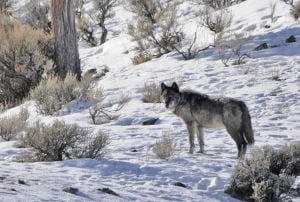State’s attempt to reverse decision is rejected Tuesday.
Posted: Wednesday, October 1, 2014
If Wyoming leaders had their way, today would have been the opener of the 2014 wolf hunt.
But the hunt will not go on.
“Wyoming has been successful in its management of gray wolves,” Mead said in a statement. “There were more wolves in Wyoming at the end of 2013 than in 2012. Wyoming has managed wolves well above the minimum and buffer population numbers.
After
two years with wolves under state control, U.S. District Court Judge
Amy Berman Jackson affirmed Tuesday that Wyoming’s wolves would be
managed by the U.S. Fish and Wildlife Service — for now, at least.
Wyoming,
the U.S. Fish and Wildlife Service and pro-hunting groups had requested
that Jackson reconsider her Sept. 23 ruling. The state issued an
emergency rule over the weekend that was intended to address her
concerns.
In
response to a 2012 lawsuit, Jackson ruled last week in favor of six
conservation groups, stripping Wyoming wildlife managers of authority to
manage the state’s wolves, calling it “arbitrary and capricious” to
“rely on the state’s non-binding promises to maintain a particular
number of wolves.”
Gov. Matt Mead responded to Jackson’s affirmation of the ruling with disappointment.
“Wyoming has been successful in its management of gray wolves,” Mead said in a statement. “There were more wolves in Wyoming at the end of 2013 than in 2012. Wyoming has managed wolves well above the minimum and buffer population numbers.
“Overturning
the [U.S. Fish and Wildlife Service] delisting decision on a
technicality highlights Wyoming’s concerns with the Endangered Species
Act,” the governor said.
Hunting advocates dismayed
Wyoming hunting advocates shared his concerns.
Bob
Wharff, executive director of Wyoming Sportsmen for Fish and Wildlife,
was discouraged that there could be an extended period ahead when wolves
cannot be hunted.
“It’s
amazing to me that we can win on the major challenges and lose on a
technicality,” Wharff said. “Her ruling clearly stated that wolves are
not threatened or endangered, and that they’re clearly recovered. She
said that the challenge that the predator zone was a significant portion
of their range was unfounded.
“Yet
she chose to hang her hat on a technicality,” he said. “It doesn’t bode
well for our system of laws. To me this was legislation from the
bench.”
According
to The Associated Press, Jackson’s decision leaves Wyoming and the Fish
and Wildlife Service with the choice of appealing or developing a
revised management plan. The planning can take years and will require
more public comment, during which time Wyoming wolves will remain
protected under the federal Endangered Species Act.
Wyoming wildlife managers said they will join the fight to regain control.
“We
will continue to work with the Wyoming Attorney General’s Office to
address relevant concerns and ensure wolf management is returned to the
state,” Brian Nesvik, the Wyoming Game and Fish Department’s chief game
warden, said in a statement.
Wolf numbers healthy
In
two years of hunting Wyoming’s wolf population stayed mostly stable. At
last assessment wolf numbers within state jurisdiction had swelled by
about 5 percent, increasing by 13 animals to 199 wolves running in 30
packs.
About another 100 wolves live in Yellowstone National Park and on the Wind River Indian Reservation.
Conservation groups applauded word that the judge had upheld her ruling.
The
law firm Earthjustice argued the case on behalf of the Center for
Biological Diversity, Defenders of Wildlife, Fund for Animals, Humane
Society of the United States, Natural Resources Defense Council and the
Sierra Club.
Ralph
Henry, deputy director for litigation at the Humane Society of the
United States, told The Associated Press his group believes it’s time
for state and federal regulators to take a new approach to Wyoming wolf
management.
“We think that the federal court was right to put the brakes on that effort,” Henry said.
The
Humane Society, Henry said, was concerned that Wyoming’s management
plan showed the state was acting aggressively and recklessly to reduce
wolf numbers to the bare minimum.
Wyoming
managers had been looking for a population of 160 wolves. Models
predict that 140 wolves are necessary to ensure there are 10 breeding
pairs in the state, which was a condition of the state’s delisting
agreement.
Wharff
is standing behind Wyoming’s management plan, which includes a
shoot-on-sight “predator zone” that covers more than 80 percent of the
state.
“I think that environmental groups are extremely naive to think that Wyoming is going to be doing anything different,” he said.
“I’m
just hoping sportsmen will not lose their faith in the system and take
the law into their own hands,” Wharff said. “A lot of people are talking
about the three S’s” — shoot, shovel and shut up — “I don’t condone
that type of activity, and I can’t advocate that. We’re a country of
laws.”
source
source



No comments:
Post a Comment